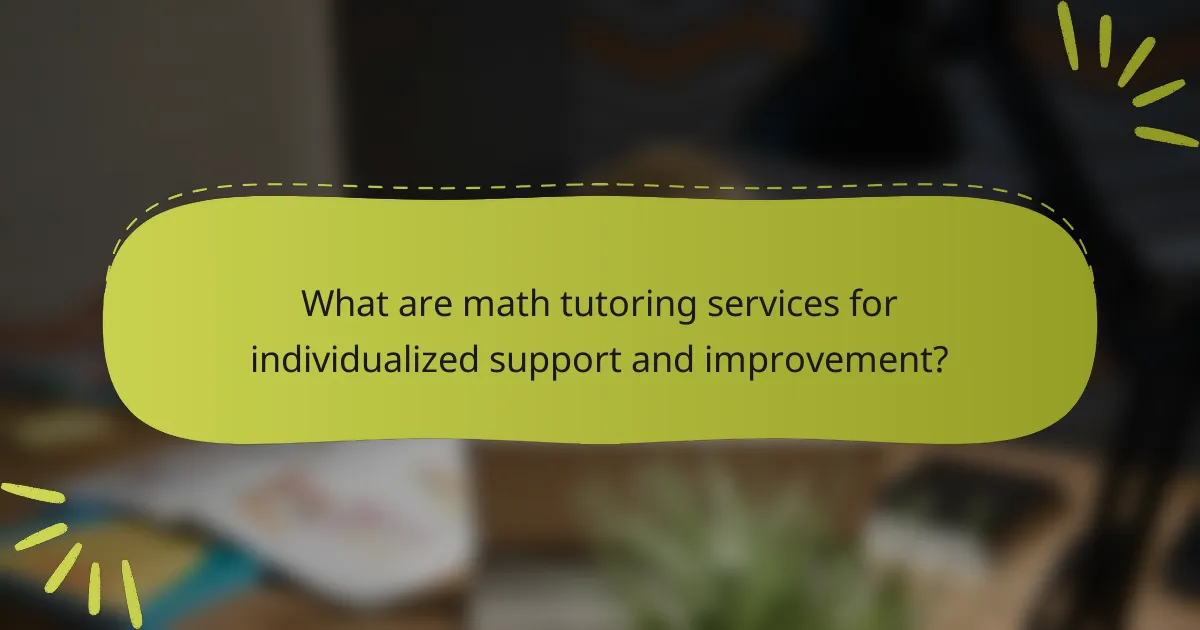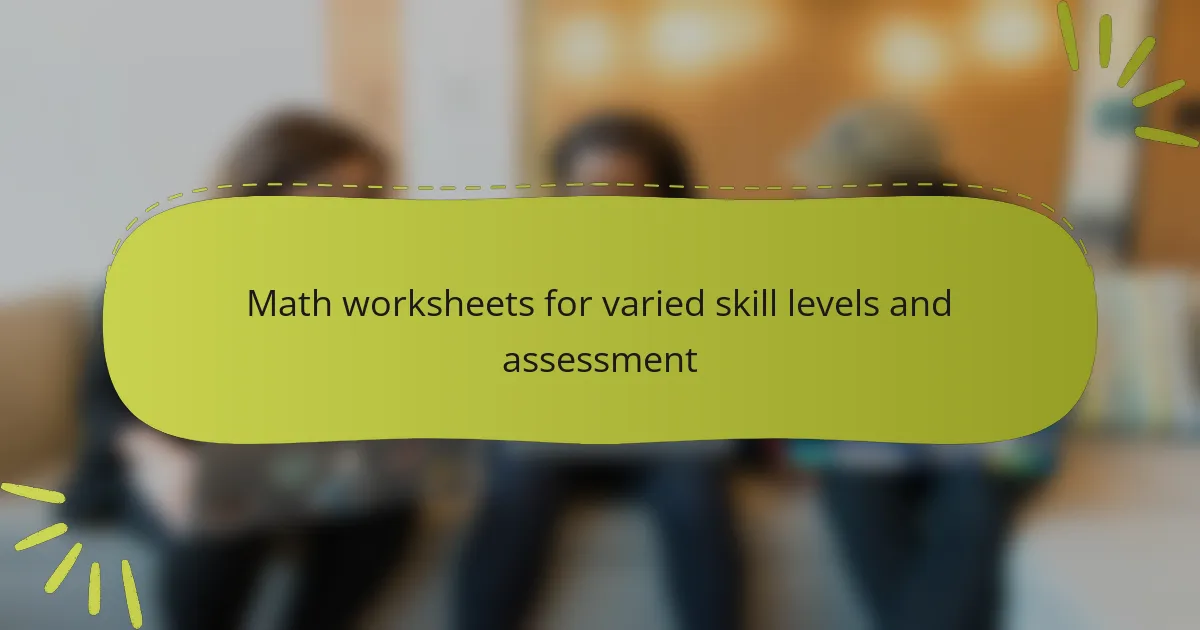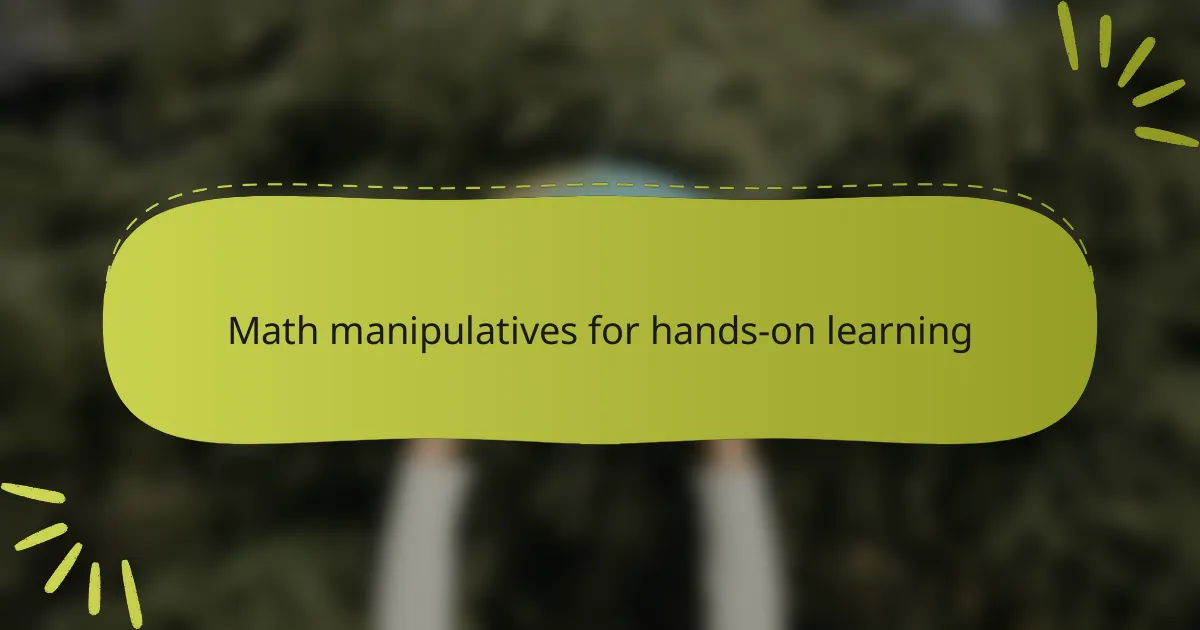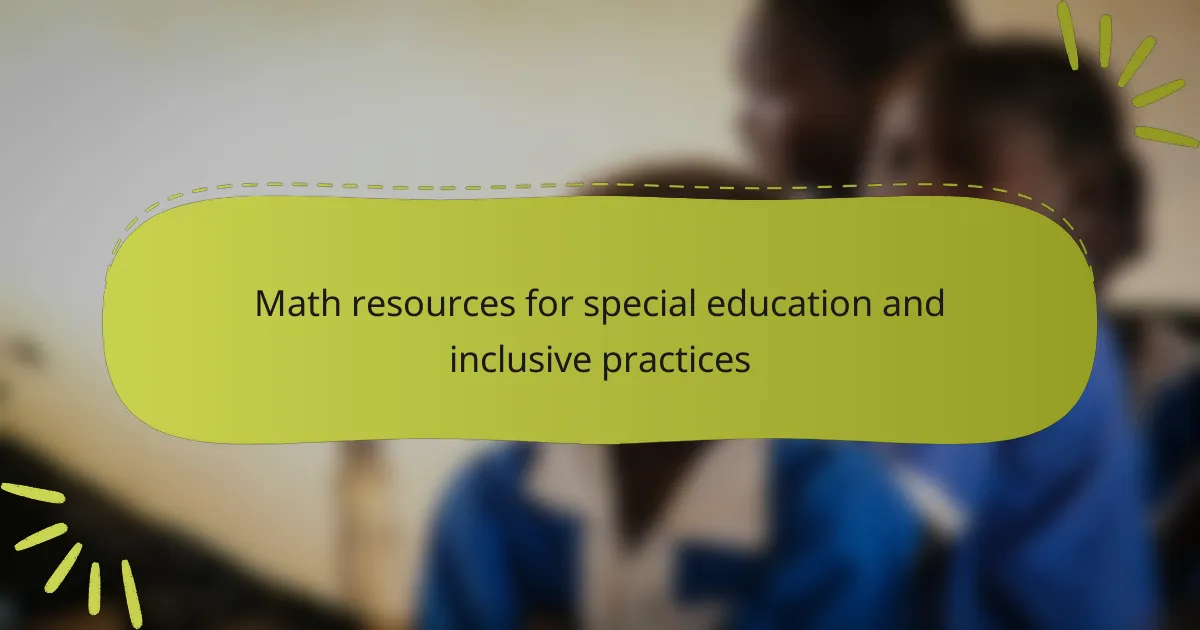Math tutoring services offer personalized assistance aimed at improving students’ mathematical skills through tailored one-on-one sessions. These services involve an assessment of each student’s current knowledge to identify specific areas needing improvement, followed by the creation of customized lesson plans. Topics covered in math tutoring include algebra, geometry, calculus, and statistics. Research highlights the effectiveness of individualized tutoring, with studies indicating that students receiving such support tend to achieve higher scores on standardized tests, underscoring the potential for significant academic growth.

What are math tutoring services for individualized support and improvement?
Math tutoring services provide personalized assistance to students seeking to enhance their mathematical skills. These services typically involve one-on-one sessions tailored to the individual needs of each student. Tutors assess a student’s current knowledge and identify specific areas for improvement. They then create customized lesson plans that focus on these areas. Math tutoring can cover various topics, including algebra, geometry, calculus, and statistics. Research indicates that personalized tutoring can lead to significant improvements in academic performance. A study published in the Journal of Educational Psychology found that students receiving individualized tutoring scored higher on standardized tests compared to those who did not. This evidence supports the effectiveness of math tutoring services in fostering academic growth.
How do math tutoring services cater to individual learning needs?
Math tutoring services cater to individual learning needs by providing personalized instruction tailored to each student’s unique challenges. They assess students’ strengths and weaknesses through diagnostic tests. This assessment helps identify specific areas that require focus. Tutors then develop customized lesson plans based on these assessments. These plans often incorporate various teaching methods to accommodate different learning styles. One-on-one sessions allow for immediate feedback and adjustments. Additionally, tutoring services may offer flexible scheduling to meet the student’s availability. Research indicates that personalized tutoring can lead to improved academic performance, with studies showing an average increase of one grade level in math proficiency.
What assessment methods are used to identify a student’s strengths and weaknesses?
Assessment methods used to identify a student’s strengths and weaknesses include formative assessments, summative assessments, and diagnostic assessments. Formative assessments provide ongoing feedback during the learning process. Examples include quizzes, class discussions, and homework assignments. Summative assessments evaluate student learning at the end of an instructional unit. Standardized tests and final exams are common summative assessments. Diagnostic assessments identify specific areas where a student may struggle. These assessments often occur before instruction begins, helping to tailor learning experiences. Each method contributes to a comprehensive understanding of a student’s abilities and challenges.
How do tutors customize lesson plans based on student assessments?
Tutors customize lesson plans based on student assessments by analyzing individual performance data. They begin by reviewing assessments to identify strengths and weaknesses. This allows tutors to tailor content to address specific learning gaps. For instance, if a student struggles with algebra, the tutor focuses on related concepts. Tutors also adjust the pace of lessons based on student comprehension levels. Regular feedback from students further informs lesson adjustments. This personalized approach enhances engagement and effectiveness. Research shows that individualized instruction significantly improves academic outcomes.
What types of math tutoring services are available?
Various types of math tutoring services are available to cater to different learning needs. These include one-on-one tutoring sessions, which provide personalized attention to students. Group tutoring sessions are also common, allowing students to learn collaboratively. Online math tutoring services have gained popularity, offering flexibility and accessibility. Specialized tutoring for standardized tests, such as the SAT or ACT, focuses on math sections of these exams. Additionally, remedial tutoring supports students who struggle with foundational math concepts. Enrichment tutoring is available for advanced students seeking to deepen their understanding. Each type of service aims to enhance math skills and boost confidence in the subject.
What are the differences between in-person and online math tutoring?
In-person math tutoring involves face-to-face interactions between the tutor and student. This format allows for immediate feedback and personalized attention. Students can ask questions and receive answers in real-time. Non-verbal cues can enhance understanding during lessons.
Online math tutoring takes place through digital platforms. It offers flexibility in scheduling and location. Students can access a wider range of tutors from various locations. Online tools can facilitate interactive learning experiences.
Both formats have unique benefits tailored to different learning styles. Studies show that in-person tutoring can improve engagement, while online tutoring can provide access to diverse resources.
How do group tutoring sessions compare to one-on-one tutoring?
Group tutoring sessions provide collaborative learning experiences, while one-on-one tutoring offers personalized attention. In group settings, students benefit from peer interaction and diverse perspectives. This can enhance problem-solving skills and foster a sense of community. Conversely, one-on-one tutoring allows for tailored instruction that addresses specific student needs. Individual sessions can adapt to a learner’s pace and style, which may lead to more effective understanding. Research indicates that students in one-on-one tutoring often achieve higher academic performance compared to those in group sessions, as personalized feedback is more immediate and focused.
What qualifications should a math tutor have?
A math tutor should have a strong educational background in mathematics. This often includes a degree in mathematics or a related field. Many effective tutors also possess teaching credentials or certifications. Experience in teaching or tutoring math at various levels is crucial. Familiarity with different teaching methodologies enhances a tutor’s effectiveness. Strong communication skills are essential for explaining complex concepts. Additionally, a good tutor should be patient and adaptable to meet individual student needs. These qualifications help ensure that tutors can provide effective, personalized support for students.
What educational background is beneficial for math tutors?
A beneficial educational background for math tutors typically includes a degree in mathematics or a related field. Many tutors hold a bachelor’s degree in mathematics, education, or engineering. Advanced degrees, such as a master’s in mathematics or education, can enhance a tutor’s expertise. Coursework in pedagogy is also advantageous for effective teaching methods. Experience in tutoring or teaching mathematics is often essential. Certification programs can further validate a tutor’s qualifications. Research indicates that tutors with strong educational backgrounds tend to achieve better student outcomes. This correlation highlights the importance of formal education in math tutoring effectiveness.
How important is teaching experience in selecting a math tutor?
Teaching experience is very important in selecting a math tutor. Experienced tutors often have a deeper understanding of teaching methods. They can adapt their strategies to meet individual student needs. Research shows that effective teaching can significantly improve student outcomes. A study by the National Bureau of Economic Research found that experienced teachers lead to higher student achievement in math. Therefore, selecting a tutor with teaching experience increases the likelihood of academic success.
How can parents choose the right math tutoring service?
Parents can choose the right math tutoring service by evaluating several key factors. First, assess the tutor’s qualifications and experience. Look for tutors with a strong background in mathematics and relevant teaching experience. Second, consider the tutoring approach and methods used. Effective services often tailor their methods to individual student needs. Third, check the service’s track record of success. Reviews and testimonials from other parents can provide insight into effectiveness. Fourth, evaluate the flexibility of scheduling and location. Convenient options can enhance the tutoring experience. Lastly, consider the cost and whether it fits within your budget. Research shows that investing in quality tutoring can lead to significant improvements in student performance.
What factors should be considered when evaluating tutoring options?
When evaluating tutoring options, consider the tutor’s qualifications and experience. A qualified tutor should have a strong background in math education. Look for credentials such as degrees in mathematics or education. Experience in teaching or tutoring math is also essential. Evaluate the tutor’s teaching style and approach. Different students respond to various methods, so find a match for the learner’s needs. Assess the availability and flexibility of the tutor’s schedule. Consistent sessions are crucial for improvement. Consider the location of tutoring sessions, whether in-person or online. Online tutoring offers flexibility, while in-person can provide direct interaction. Review testimonials or references from previous students. Positive feedback can indicate a tutor’s effectiveness. Lastly, discuss pricing and payment options. Ensure the tutoring service fits within your budget while offering quality support.
How can parents assess the effectiveness of a math tutor?
Parents can assess the effectiveness of a math tutor by monitoring their child’s progress. Regular assessments such as quizzes and tests can reveal improvements in understanding and application of math concepts. Observing changes in the child’s confidence and attitude towards math is also crucial. Parents should communicate with the tutor to discuss teaching methods and progress updates. Tracking homework completion and the quality of work can provide insights into the tutor’s impact. Feedback from the child about their learning experience is valuable. Consistent improvement in grades over time is a strong indicator of a tutor’s effectiveness.
What are the expected outcomes of math tutoring services?
Math tutoring services typically lead to improved academic performance in mathematics. Students often experience higher grades and test scores after receiving tutoring. Tutoring can enhance understanding of mathematical concepts. This support helps build confidence in students’ abilities. Personalized instruction addresses individual learning needs effectively. Research shows that students who engage in tutoring demonstrate greater retention of material. According to a study by the National Tutoring Association, 70% of students report improved attitudes toward math after tutoring. These outcomes highlight the effectiveness of math tutoring services in fostering academic success.
How can math tutoring improve a student’s academic performance?
Math tutoring can significantly enhance a student’s academic performance. It provides personalized instruction tailored to the student’s specific needs. This individualized approach helps address gaps in understanding. Tutoring sessions often reinforce classroom learning, leading to better retention of concepts. Additionally, students gain confidence in their math skills, which can improve their overall attitude towards the subject. Research shows that students who receive tutoring tend to achieve higher grades and test scores. A study by the Institute of Education Sciences found that students receiving tutoring improved their math scores by an average of 20 percentile points. Thus, math tutoring effectively boosts academic performance through personalized support and improved understanding.
What long-term benefits can arise from individualized math support?
Individualized math support can lead to enhanced long-term academic performance. Students receiving tailored assistance often show improved understanding of mathematical concepts. This understanding can translate to higher grades in math-related subjects. Furthermore, individualized support builds confidence in students’ abilities. Increased confidence often leads to a more positive attitude towards learning. Research indicates that students engaged in personalized tutoring perform better on standardized tests. Long-term benefits also include the development of critical thinking and problem-solving skills. These skills are essential for success in higher education and future careers.
What tips can enhance the effectiveness of math tutoring?
Effective math tutoring can be enhanced by establishing clear goals and objectives. Setting specific learning targets helps both tutor and student focus on desired outcomes. Incorporating varied teaching methods caters to different learning styles. For instance, visual aids can benefit visual learners, while hands-on activities may assist kinesthetic learners.
Regular assessments track progress and identify areas needing improvement. These assessments can include quizzes, practice problems, or informal discussions. Building a positive rapport between tutor and student fosters a comfortable learning environment. This encourages open communication and reduces anxiety related to math.
Encouraging active participation keeps students engaged. Asking questions and prompting discussions can deepen understanding. Providing constructive feedback reinforces learning and builds confidence. This feedback should be specific and actionable.
Utilizing real-world examples makes math concepts relatable. Connecting lessons to everyday situations enhances comprehension. Lastly, maintaining a consistent tutoring schedule ensures steady progress. Regular sessions help reinforce learning and create a routine.
How can students prepare for their tutoring sessions?
Students can prepare for their tutoring sessions by reviewing relevant materials beforehand. This includes going over their notes and textbooks related to the topics they will discuss. They should identify specific questions or problems they need help with. Preparing a list of these questions ensures focused tutoring time. Additionally, students should gather any assignments or tests that relate to the tutoring session. This context helps tutors understand the student’s challenges. Setting clear goals for what they want to achieve during the session is also beneficial. Finally, students should ensure they have all necessary materials ready, such as calculators or worksheets. This preparation enhances the effectiveness of the tutoring session.
What role does communication between parents and tutors play in student success?
Communication between parents and tutors is crucial for student success. It fosters collaboration and ensures that both parties are aligned on educational goals. Regular updates from tutors inform parents about their child’s progress. This allows parents to support learning at home effectively. Additionally, open communication helps identify challenges early. Addressing issues promptly can lead to timely interventions. Research shows that students with engaged parents perform better academically. Effective communication enhances the overall educational experience for students.
Math tutoring services provide personalized support to enhance students’ mathematical skills through tailored instruction. These services assess individual strengths and weaknesses, creating customized lesson plans that cover various topics such as algebra, geometry, and calculus. Research indicates that personalized tutoring significantly improves academic performance, with students often achieving higher grades and increased confidence. The article explores different types of tutoring services, assessment methods, qualifications for tutors, and strategies for maximizing the effectiveness of tutoring sessions, emphasizing the importance of individualized support for long-term academic success.



